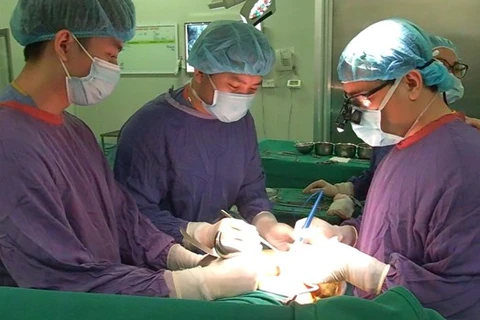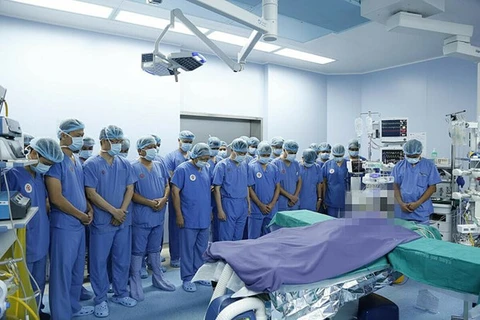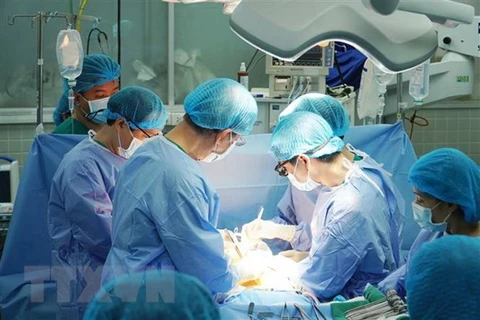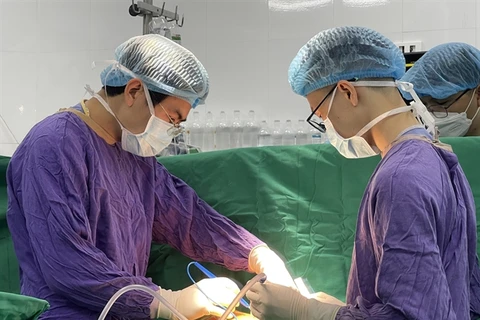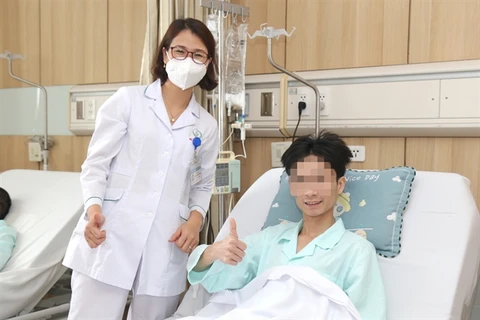Hanoi (VNA) – Doctors at Viet Duc Hospital in Hanoi have successfully performed multi-organ transplant from two brain-dead donors to eight patients, according to hospital director Duong Duc Hung.
The donors, both men, aged 25 and 32, were residents of the northern provinces of Thai Nguyen and Phu Tho. They had suffered severe traumatic brain injuries and had been in deep comas following traffic accidents.
Following days of intensive care, doctors declared brain death for both of them after three tests for each patient had failed to show signs of life.
The families of both consented to donate the deceased’s organs, including two hearts, two livers, four kidneys, two iliac veins, two tracheas, four corneas, and 11 tendons.
Associate Professor Dong Van He, the hospital’s Deputy Director and Director of the National Coordinating Centre for Organ Transplantation (NCCOT), said that the two major surgeries were conducted from 20:40pm on January 3 to 9:30am the following day to take organs and tissues from donors.
The donations have helped save the lives of eight people. Of these, two patients received heart transplants, two got new livers, and four have new kidneys.
All the transplant surgeries were successful, and the patients were in stable conditions.
Two corneas and one liver were transferred to Central Military Hospital 108 while two corneas to the Central Eye Hospital for suitable recipients.
Earlier on March 23 last year, doctors at Viet Duc Hospital successfully performed the 100th multi-organ transplant from a brain-dead donor, marking a step forward for the hospital and Vietnam’s health sector.
The donor was a brain-dead patient, a 32-year-old resident of Bac Giang province.
On March 6, he was victimised in a traffic accident and then rushed to a hospital. Medical professionals proposed organ donation after brain death, to which his family agreed.
A major surgery was performed, starting at 2:30pm on March 7, to take the brain-dead patient’s heart, liver, two kidneys, four blood vessels, 14 tendons, and two cartilages.
With these organs, the hospital successfully conducted a heart transplant for a 53-year-old woman with terminal-stage heart failure in Bac Giang province, a liver transplant for a 33-year-old man with biliary cysts in Ninh Binh province, and a kidney transplant for a 42-year-old man with terminal-stage chronic renal failure in Hai Phong city. The remaining kidney was transplanted to a 48-year-old male patient also in Hai Phong city.
According to the NCCOT, tens of thousands of people are in need of organ and tissue transplants to live on but there are not enough organ donations for them.
Viet Duc Hospital leads the country in organ and tissue retrieval and transplantation from brain-dead donors. It has so far performed 59 heart, 88 liver, 185 kidney, and many other tissue transplants since 2010.
Tissue and organ transplant is one of the great achievements of the medical industry and is a life-saving treatment for patients with chronic and fatal diseases.
Nearly 8,000 organ transplants have been carried out in Vietnam since the first in 1992. At present, 95% of the transplants in the country use organs from living donors and only 5% from brain-dead ones.
According to the Ministry of Health, the number of people registered for organ donation rose substantially from 265 in 2014 to over 73,000 by the end of June last year./.


